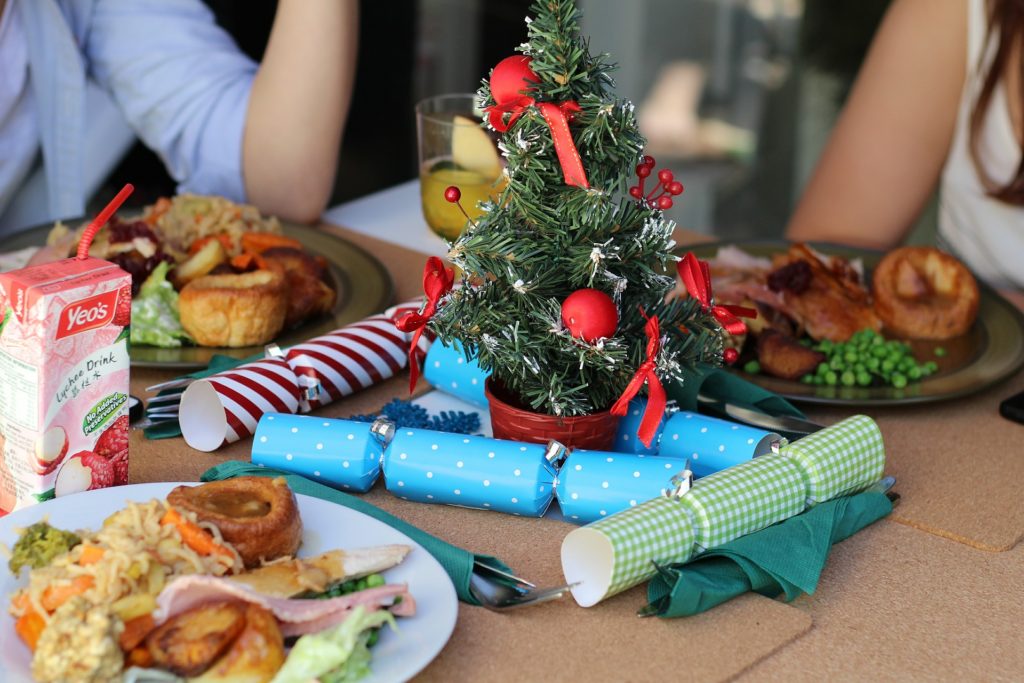- Calls to this hotline are currently being directed to Within Health, Fay or Eating Disorder Solutions
- Representatives are standing by 24/7 to help answer your questions
- All calls are confidential and HIPAA compliant
- There is no obligation or cost to call
- Eating Disorder Hope does not receive any commissions or fees dependent upon which provider you select
- Additional treatment providers are located on our directory or samhsa.gov
Responding to Negative Food Talk at Holiday Parties

“I shouldn’t have eaten that second piece of pie, I’m so bad.” “I am going to have to spend all day tomorrow at the gym to work off that dinner.” “My juice cleanse starts January 1st!”
The holidays have become a time when it is socially acceptable to engage in negative food talk, or talking about food in a disordered way.
Everyone has probably been faced with this during the holiday season in some form. In recovery, it can be frustrating and challenging to know how to respond to your loved ones when these situations arise at holiday parties or events.
How to Ignore Negative Food Talk
If you do not feel like confronting the situation, you can try to ignore negative food talk when it inevitably comes up. The deeper you get into recovery, the easier it will be to let these potentially triggering comments roll off your back.
Either tune out at that point in the conversation or quickly transition to a different topic. This can help you salvage the interaction and take the focus away from food.
Of course, this is easier said than done. If you do not feel like you are able to ignore negative food talk or simply change the subject, it might be important for your own recovery to address it with your loved one in the moment.
Recognizing a Teachable Moment
It can feel like a slap in the face when a loved one knows that you are in recovery and continues to engage in negative food talk. First, recognize that their own disordered thoughts and their relationship with food is their own issue and has nothing to do with you.
That being said , it can feel personal when you hear loved ones talking about food or exercise in this way when they know all that you have gone through. If it is a safe space and you feel comfortable being honest with this individual, you can view it as a teachable moment.
, it can feel personal when you hear loved ones talking about food or exercise in this way when they know all that you have gone through. If it is a safe space and you feel comfortable being honest with this individual, you can view it as a teachable moment.
In a respectful way, explain to your friend or family member why their language is hurtful to you as someone in eating disorder recovery. They likely had not even considered that, since negative food talk is often second nature.
Share why attaching morality to food or even joking about compensatory behaviors, including compulsive exercise, can be harmful and potentially triggering to many people. Regardless of whether someone has struggled with an eating disorder, negative food talk often sinks in at some level and is reflected in that individual’s relationship with food.
If your loved one is not in a place emotionally where they can truly hear what you are saying, try not to be discouraged. All you can do is share your truth and spread awareness. What they do with that new knowledge is out of your control.
Removing Yourself from the Situation
Sometimes the best way to respond to negative food talk is to remove yourself from the situation. This might come after trying to ignore it or addressing it with your loved one, or this can be your initial response.
 It could be argued that this is a form of avoidance, but the reality is that it is a form of self-preservation. If you are not able to cope in other ways for whatever reason, or you simply do not have the energy or desire to address it at a holiday party, getting out of the situation is your prerogative.
It could be argued that this is a form of avoidance, but the reality is that it is a form of self-preservation. If you are not able to cope in other ways for whatever reason, or you simply do not have the energy or desire to address it at a holiday party, getting out of the situation is your prerogative.
This does not mean you have to leave a party entirely or cut that loved one out of your life. Simply leave that conversation and find someone else to speak with, or excuse yourself to use the restroom and join another group when you return. If needed, you can use this time to connect with a support person to process how you might have been triggered.
Always Be Prepared
Talking about food in a disordered way has been normalized and is something that individuals in recovery must be prepared to face, especially during the holidays. Equipping yourself with possible response options and healthy coping tools can mitigate triggers.
Try not to let the way that other people talk about food affect your own food behaviors, whether you are at a party or struggling with uncomfortable feelings after the holidays. Stripping negative food talk of its power can in turn empower you to stay on track this holiday season.
Community Discussion – Share your thoughts here!
What tips do you have for responding to negative food talk during the holidays?
 About the Author: Courtney Howard is the Director of Operations & Business Development at Eating Disorder Hope. She graduated summa cum laude with a B.A. from San Diego State University, holds a paralegal certificate in Family Law, and is a Certified Domestic Violence Advocate. After obtaining her certification as a life coach, Courtney launched Lionheart Eating Disorder Recovery Coaching in 2015 and continues to be a passionate advocate for awareness and recovery.
About the Author: Courtney Howard is the Director of Operations & Business Development at Eating Disorder Hope. She graduated summa cum laude with a B.A. from San Diego State University, holds a paralegal certificate in Family Law, and is a Certified Domestic Violence Advocate. After obtaining her certification as a life coach, Courtney launched Lionheart Eating Disorder Recovery Coaching in 2015 and continues to be a passionate advocate for awareness and recovery.
The opinions and views of our guest contributors are shared to provide a broad perspective of eating disorders. These are not necessarily the views of Eating Disorder Hope, but an effort to offer discussion of various issues by different concerned individuals.
We at Eating Disorder Hope understand that eating disorders result from a combination of environmental and genetic factors. If you or a loved one are suffering from an eating disorder, please know that there is hope for you, and seek immediate professional help.
Last Updated & Reviewed By: Jacquelyn Ekern, MS, LPC on December 21, 2016
Published on EatingDisorderHope.com

The EatingDisorderHope.com editorial team comprises experienced writers, editors, and medical reviewers specializing in eating disorders, treatment, and mental and behavioral health.

